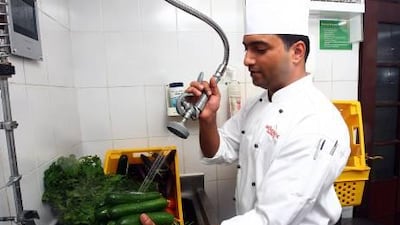Dubai has banned imports of lettuce, organic cucumbers and tomatoes from Spain, Germany, the Netherlands and Denmark after an outbreak of E.coli in Europe left 16 people dead and more than 1,000 sick.
While organic cucumbers from Spain are thought to be responsible for the outbreak, all fruit and vegetable imports from Europe will now be tested for the bacterium.
"More vegetables could be affected," said a spokesman for Dubai Municipality's Food Control Department. "Cases in Spain have been confirmed while the rest are still under investigation."
He said the authority was waiting for a decision from the Ministry of Environment and Water on whether to ban all European vegetables, as the source of the contamination was still unclear.
"The safety of the public is of the utmost importance and we will stop any import of vegetables that contain the bacteria," said a spokeswoman for the ministry. "We will take samples and if they have the bacteria then the imports will be stopped."
More than 370 cases of haemolytic uraemic syndrome - caused by a strain of the E.coli bacteria that produces Shiga toxin - have been reported in Germany since the second week of May.
So far, more than 1,150 people have been infected in an outbreak the World Health Organisation has described as "severe". The bacteria affect the blood, kidneys and, in severe cases, the nervous system and can be particularly serious for children and the elderly.
Thirty six people from Sweden have been affected, all of whom had visited northern Germany, and there have been infections in Britain, Denmark, France and the Netherlands.
Food watchdogs said they had been taking precautions even before the ministry's announcement.
"We are part of a global Infosan system that notifies members of any potential outbreak of disease and we already had food safety teams doing tests on imported vegetables," said Mohammed al Reyaysa, the director of communications at Abu Dhabi's Food Control Authority (ADFCA).
He said no evidence had been found of E. coli so far but testing would continue on European and, in particular, Spanish produce.
Vegetables are tested in ADFCA laboratories when they arrive in the country, with results available the same day.
Mr al Reyaysa urged people not to panic.
Some supermarkets were yesterday waiting for notification of the ban before taking action.
"We haven't been informed of the ban yet but we will support the authorities on what they decide," said a spokeswoman for Waitrose in Dubai Mall. "We only sell the Dutch cucumbers from the list so it would not affect us that much."
Carrefour said it did not stock cucumbers from the two Spanish suppliers suspected by European authorities of being the sources of the outbreak.
As a precaution it had withdrawn all Spanish cucumbers from its stores and replaced them with produce from France.
"We do our own tests on the imported items when they arrive but they are also tested by the Ministry of Environment and the authorities at the airport," said Jithesh Jayaraj, the business development manager for Barakat Vegetables and Fruits, a Dubai importer and wholesaler.
He said most cucumbers and other vegetables were imported from Egypt, Jordan and Oman.
Nils El Accad, the chief executive of Organic Foods and Cafe in Dubai Mall, said his company's policy was to import produce from the Mena region to reduce its carbon footprint.
Some shoppers said they were concerned, but most said they bought cheaper local vegetables.
"It's worrying what is happening in Europe but to be honest I usually buy the cheaper local fruit and vegetables anyway," said Abdul Azziz, a British Pakistani living in Dubai. "I think as long as you are careful when you handle the vegetables you should be fine."
Jennifer Anderson, a mother of three from Canada, agreed: "I do buy some European vegetables but most people I know, myself included, mainly go for the cheaper local stuff."
She said she would become more concerned if the list of contaminated vegetables increased and there was a shortage in supermarkets.
Travellers to Europe should take care over what they eat and visit the nearest hospital if they do fall ill.
* With agencies

